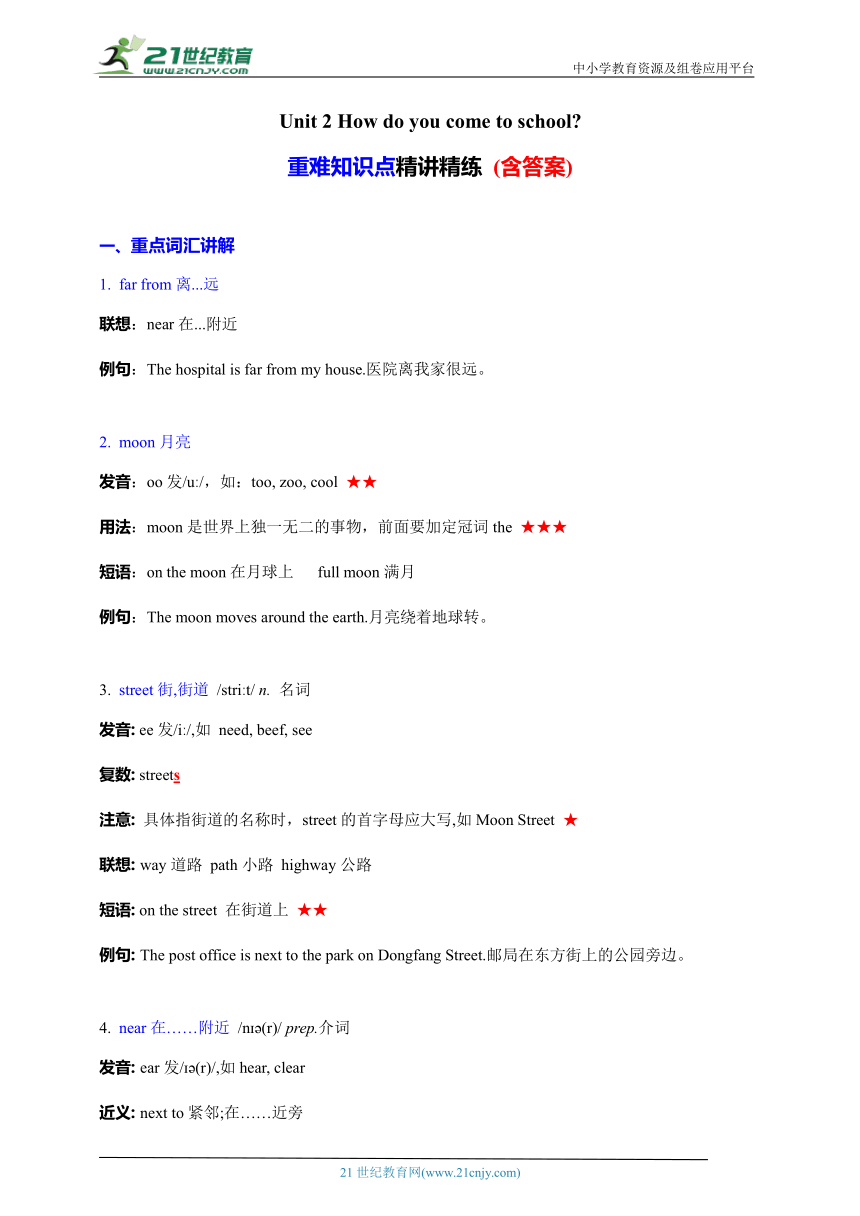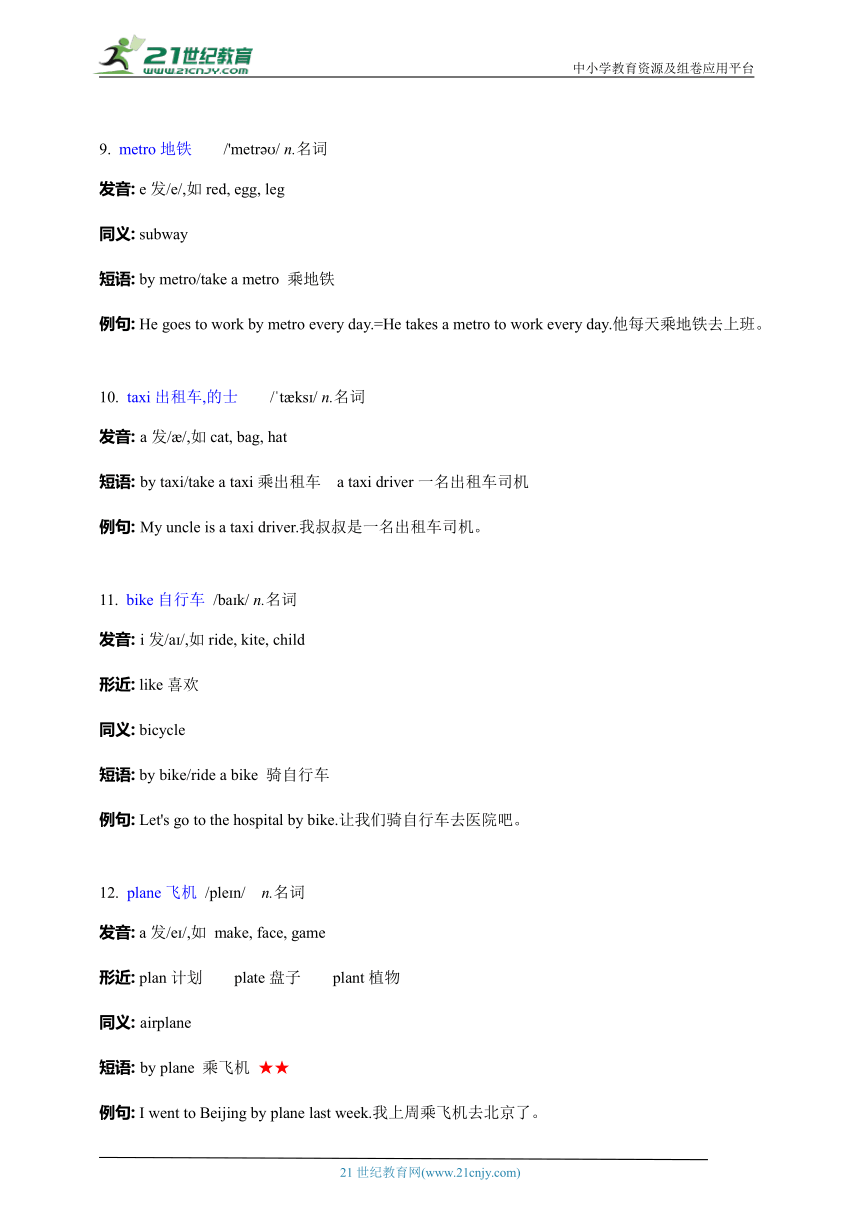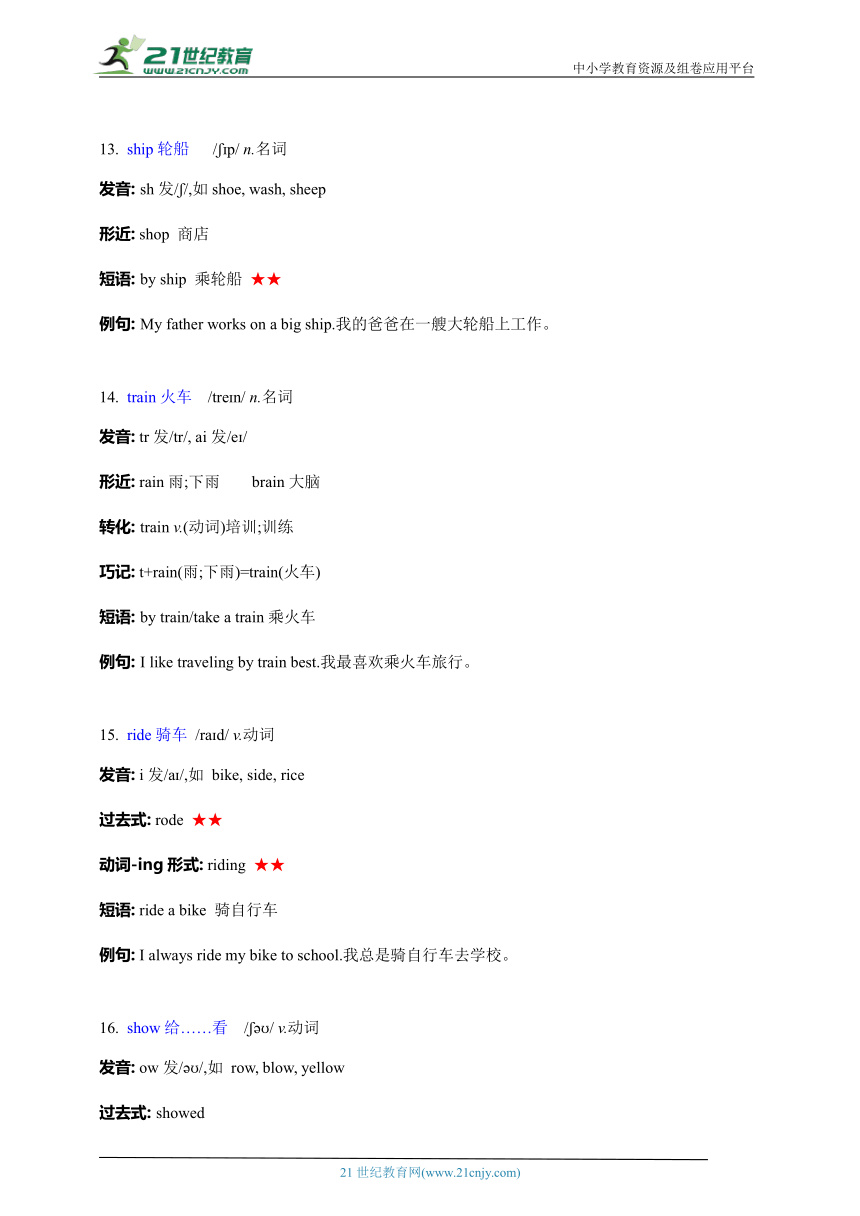Unit 2 How do you come to school? 重难点精讲精练 (含答案)
文档属性
| 名称 | Unit 2 How do you come to school? 重难点精讲精练 (含答案) |

|
|
| 格式 | docx | ||
| 文件大小 | 309.0KB | ||
| 资源类型 | 试卷 | ||
| 版本资源 | 牛津译林版 | ||
| 科目 | 英语 | ||
| 更新时间 | 2024-05-16 00:00:00 | ||
图片预览





文档简介
中小学教育资源及组卷应用平台
Unit 2 How do you come to school
重难知识点精讲精练 (含答案)
重点词汇讲解
far from离...远
联想:near在...附近
例句:The hospital is far from my house.医院离我家很远。
moon月亮
发音:oo发/u /,如:too, zoo, cool ★★
用法:moon是世界上独一无二的事物,前面要加定冠词the ★★★
短语:on the moon在月球上 full moon满月
例句:The moon moves around the earth.月亮绕着地球转。
street街,街道 /stri t/ n. 名词
发音: ee发/i /,如 need, beef, see
复数: streets
注意: 具体指街道的名称时,street的首字母应大写,如Moon Street ★
联想: way道路 path小路 highway公路
短语: on the street 在街道上 ★★
例句: The post office is next to the park on Dongfang Street.邮局在东方街上的公园旁边。
near在……附近 /n (r)/ prep.介词
发音: ear发/ (r)/,如hear, clear
近义: next to紧邻;在……近旁
转化: near adj.(形容词)距离近;不远
巧记: n+ear(耳朵)=near(在……附近)
例句: He sits near the window.他坐在窗户附近。
\city城市 / s t / n.名词
发音: c发/s/, 如 bicycle, rice
复数: cities ★★
例句: Beijing is a beautiful city.北京是一座美丽的城市。
by…乘(汽车、火车等) /ba / prep.介词
发音: y发/a /,如my, fly, sky
同音: buy买 bye再见
短语: by bus乘公共汽车 by train乘火车
例句: My mother goes to work by bus.我妈妈乘公共汽车去上班。
I often go to school by bike. 我经常骑自行车去上学。
bus公共汽车,巴士 /b s/ n. 名词
发音:u发/ /,如cut, much, cup
复数: buses
短语: school bus校车 by bus乘公共汽车
同义词组: watch a film
例句: Let's go to the cinema by bus! 让我们乘公共汽车去看电影吧!
on foot步行
联想: walk步行
例句: It's not far from here. Let's go on foot.它离这里不远。让我们步行去吧。
metro地铁 /'metr / n.名词
发音: e发/e/,如red, egg, leg
同义: subway
短语: by metro/take a metro 乘地铁
例句: He goes to work by metro every day.=He takes a metro to work every day.他每天乘地铁去上班。
taxi出租车,的士 / t ks / n.名词
发音: a发/ /,如cat, bag, hat
短语: by taxi/take a taxi乘出租车 a taxi driver一名出租车司机
例句: My uncle is a taxi driver.我叔叔是一名出租车司机。
bike自行车 /ba k/ n.名词
发音: i发/a /,如ride, kite, child
形近: like喜欢
同义: bicycle
短语: by bike/ride a bike 骑自行车
例句: Let's go to the hospital by bike.让我们骑自行车去医院吧。
plane飞机 /ple n/ n.名词
发音: a发/e /,如 make, face, game
形近: plan计划 plate盘子 plant植物
同义: airplane
短语: by plane 乘飞机 ★★
例句: I went to Beijing by plane last week.我上周乘飞机去北京了。
ship轮船 / p/ n.名词
发音: sh发/ /,如shoe, wash, sheep
形近: shop 商店
短语: by ship 乘轮船 ★★
例句: My father works on a big ship.我的爸爸在一艘大轮船上工作。
train火车 /tre n/ n.名词
发音: tr发/tr/, ai发/e /
形近: rain雨;下雨 brain大脑
转化: train v.(动词)培训;训练
巧记: t+rain(雨;下雨)=train(火车)
短语: by train/take a train乘火车
例句: I like traveling by train best.我最喜欢乘火车旅行。
ride骑车 /ra d/ v.动词
发音: i发/a /,如 bike, side, rice
过去式: rode ★★
动词-ing形式: riding ★★
短语: ride a bike 骑自行车
例句: I always ride my bike to school.我总是骑自行车去学校。
show给……看 / / v.动词
发音: ow发/ /,如 row, blow, yellow
过去式: showed
动词-ing形式: showing
其他词义: show证明;表明
转化: show n.(名词)展览
短语: show up 出现,露面 show sb. around带某人四处看看 ★★★
例句: Children can show their love to their mothers.孩子们可以向他们的母亲表达他们的爱。
young年幼的 /j / adj.形容词
发音: y发/j/,如yes, yellow, you
比较级: younger更年幼的 最高级:youngest最年幼的
对应: old 年老的
短语: young people 青年,年轻人
例句: He is too young to go to school.他太年幼了,不能去上学。
basket篮子 / bɑ sk t/ n.名词
发音: a发/ɑ /, e发/ /
短语: in the basket 在篮子里 a basket of一篮……
例句: I put some apples into the basket. 我把一些苹果放进篮子里。
重难点讲解
【解析】far from为副词短语,意为“离....远”,后接地点,其反义词为near,反义短语为close to。
【例句】(1) Helen lives near our school,but I live far from it.
海伦住在我们学校附近,但是我住得离学校远。
Our new house is close to the supermarket. 我们的新房子离超市近。
【练习】按要求完成句子。
The hospital is not near the cinema. (改为同义句)
The hospital is the cinema.
【答案】far from
【解析】问句是由where引导的特殊疑问句,用来询问别人住在哪里,句型结构为
“Where十do/does十主语+live ”,其答句为“主语十live(s)in/on/near/...十地点”。
【例句】(1) --Where does Gao Shan live 高山住在哪里?
--He lives in Sunshine Town.他住在阳光镇。
(2) --Where do your grandparents live 你的(外)祖父母住在哪里?
--They live near the park. 他们住在公园附近。
【练习】按要求完成句子。
My sister lives in Shanghai.(对画线部分提问)
sister
Where do you live, Su Hai and Su Yang (beside the bookshop)(据提示回答问题)
【答案】(1)Where does your, live
(2)We live beside the bookshop.
【解析】问句是由how引导的特殊疑问句,how为疑问副词,意为“怎么样”,此处用来询问别人上学的方式。
【拓展】how的其他常用用法:
用来询问身体状况或天气。
后接其他形容词或副词,构成疑问短语how old“多大”(用来询问年龄),how many“多少”(用来询问可数名词的数量),how much “多少”(用来对不可数名词进行提问)或“多少钱”(用来询问价格),how long“多长”(用来询问物体的长度) 或“多久”(用来对一段时间进行提问)。
【例句】(1)--How does your mother go to work 你的妈妈怎样去上班?
--She goes to work by metro.她乘地铁去上班。
(2)How is the weather today 今天天气怎样?
(3)--How long is this bridge 这座桥多长?
--About eighty metres. 大约八十米。
(4)--How long does it take you to do your homework every day
你每天花费多长时间做你的家庭作业?套香离
--About two hours. 大约两小时。
【练习】按要求完成句子。
Yang Ling goes to the bookshop by bus. (对画线部分提问)
Yang Ling to the bookshop
This birthday cake is eighty yuan. (对画线部分提问)
this birthday cake
There are four seasons in a year.(对画线部分提问)
are there in a year
【答案】(1)How does,go (2)How much is (3)How many seasons
【解析】by意为“乘(汽车、火车等)”, “by十交通工具名词”表示出行的方式,在句子中作方式状语。
【拓展】表示乘坐某种交通工具还可以用“take十冠词十交通工具名词”,如take a taxi,take the metro等。注意,“步行”译为on foot,“骑自行车”译为ride a bike/bikes, 需要特别记忆。
【例句】I usually go to work by metro. = I usually take the metro to work.
我通常乘地铁去上班。
【练习】根据中文提示完成句子。
我们经常在周末乘出租车去农场。(写出两种表达)
We often the farm at weekends.
We often the farm at weekends.
【答案】(1)go to,by taxi (2)take a/the taxi to
【解析】“What about... ”用来询问对方的意见或向对方提出建议,还可以在询问对方相同情况或问题时,用它来避免重复和承接上下文,后可接名词、代词的宾格形式或动词ing形式,相当于“How about... ”。
【例句】(1) I'd like a cup of coffee. What about you 我想要一杯咖啡。你呢?
(2) It's windy now. What about flying kites 现在起风了。放风筝怎么样?
【练习】单项选择。
( )It's sunny today. What about
A.go to fish B.go fishing C.going fishing
【答案】C
【解析】want意为“想,想要”,后面可以直接接名词,也可以接动词不定式(即to do)。
want to do sth意为“想要做某事”,相当于would like to do sth。show sth to sb意为“给…看…”,相当于show sb sth。但当sth为代词的宾格形式时,只能用show sth to sb的结构。
【例句】The teacher wants to show the picture to his students.
=The teacher wants to show his students the picture.
这位老师想把这幅画给他的学生们看。
【练习】按要求完成句子。
Mike is showing me his family photo.(改为同义句)
Mike is his family photo .
Cinderella would like new clothes and shoes for the party.(改为同义句)
Cinderella new clothes and shoes for the party.
【答案】(1)showing, to me (2)wants
第二部分:易错易混全解
重介词in,on和at在动词live后的用法不清。
【例题】从方框中选择合适的单词填空。
in on at
Mr Green lives Shanghai now.
Helen lives Park Street.
Liu Hua lives 156 Huaihai Street.
【答案】(1)in (2)on (3)at
点拨: live作“住,居住”解时,可以和介词in,on或at连用。live in后通常接国家、城市等范围较大的地点;live on后通常接街道或楼层;live at后则通常接具体的街道门牌号码。题(1),设空处后为城市名,前面要用介词in,故填in。题(2),设空处后的Park Street是街道名,前面要用介词on,故填on。题(3),设空处后的l56 Huaihai Street是门牌号码,前面要用介词at,故填at。
come,get等不及物动词后接地点副词时的用法不清。
【例题】单项选择。
( )1.May lives near City Library. She can get on foot.
A.the library B.to there C.there
( )2.My mother drives me to school in the morning, but I usually come home by bus in the afternoon.
A.to B.at C./
【答案】1.C 2.C
点拨: come, get, go等为不及物动词,当它们与地点副词home, here, there连用时,地点副词前不可加介词to,因为这些地点副词本身就含有“在”或“到”的意思。题(1),get后如果要接地点名词(短语), 地点名词(短语)前要加介词to,而there为地点副词,与动词get连用时,前面无需加介词,故选C。题(2),设空处后的home为地点副词,与动词come连用时,前面无需加介词,故选C。
21世纪教育网 www.21cnjy.com 精品试卷·第 2 页 (共 2 页)
21世纪教育网(www.21cnjy.com)
Unit 2 How do you come to school
重难知识点精讲精练 (含答案)
重点词汇讲解
far from离...远
联想:near在...附近
例句:The hospital is far from my house.医院离我家很远。
moon月亮
发音:oo发/u /,如:too, zoo, cool ★★
用法:moon是世界上独一无二的事物,前面要加定冠词the ★★★
短语:on the moon在月球上 full moon满月
例句:The moon moves around the earth.月亮绕着地球转。
street街,街道 /stri t/ n. 名词
发音: ee发/i /,如 need, beef, see
复数: streets
注意: 具体指街道的名称时,street的首字母应大写,如Moon Street ★
联想: way道路 path小路 highway公路
短语: on the street 在街道上 ★★
例句: The post office is next to the park on Dongfang Street.邮局在东方街上的公园旁边。
near在……附近 /n (r)/ prep.介词
发音: ear发/ (r)/,如hear, clear
近义: next to紧邻;在……近旁
转化: near adj.(形容词)距离近;不远
巧记: n+ear(耳朵)=near(在……附近)
例句: He sits near the window.他坐在窗户附近。
\city城市 / s t / n.名词
发音: c发/s/, 如 bicycle, rice
复数: cities ★★
例句: Beijing is a beautiful city.北京是一座美丽的城市。
by…乘(汽车、火车等) /ba / prep.介词
发音: y发/a /,如my, fly, sky
同音: buy买 bye再见
短语: by bus乘公共汽车 by train乘火车
例句: My mother goes to work by bus.我妈妈乘公共汽车去上班。
I often go to school by bike. 我经常骑自行车去上学。
bus公共汽车,巴士 /b s/ n. 名词
发音:u发/ /,如cut, much, cup
复数: buses
短语: school bus校车 by bus乘公共汽车
同义词组: watch a film
例句: Let's go to the cinema by bus! 让我们乘公共汽车去看电影吧!
on foot步行
联想: walk步行
例句: It's not far from here. Let's go on foot.它离这里不远。让我们步行去吧。
metro地铁 /'metr / n.名词
发音: e发/e/,如red, egg, leg
同义: subway
短语: by metro/take a metro 乘地铁
例句: He goes to work by metro every day.=He takes a metro to work every day.他每天乘地铁去上班。
taxi出租车,的士 / t ks / n.名词
发音: a发/ /,如cat, bag, hat
短语: by taxi/take a taxi乘出租车 a taxi driver一名出租车司机
例句: My uncle is a taxi driver.我叔叔是一名出租车司机。
bike自行车 /ba k/ n.名词
发音: i发/a /,如ride, kite, child
形近: like喜欢
同义: bicycle
短语: by bike/ride a bike 骑自行车
例句: Let's go to the hospital by bike.让我们骑自行车去医院吧。
plane飞机 /ple n/ n.名词
发音: a发/e /,如 make, face, game
形近: plan计划 plate盘子 plant植物
同义: airplane
短语: by plane 乘飞机 ★★
例句: I went to Beijing by plane last week.我上周乘飞机去北京了。
ship轮船 / p/ n.名词
发音: sh发/ /,如shoe, wash, sheep
形近: shop 商店
短语: by ship 乘轮船 ★★
例句: My father works on a big ship.我的爸爸在一艘大轮船上工作。
train火车 /tre n/ n.名词
发音: tr发/tr/, ai发/e /
形近: rain雨;下雨 brain大脑
转化: train v.(动词)培训;训练
巧记: t+rain(雨;下雨)=train(火车)
短语: by train/take a train乘火车
例句: I like traveling by train best.我最喜欢乘火车旅行。
ride骑车 /ra d/ v.动词
发音: i发/a /,如 bike, side, rice
过去式: rode ★★
动词-ing形式: riding ★★
短语: ride a bike 骑自行车
例句: I always ride my bike to school.我总是骑自行车去学校。
show给……看 / / v.动词
发音: ow发/ /,如 row, blow, yellow
过去式: showed
动词-ing形式: showing
其他词义: show证明;表明
转化: show n.(名词)展览
短语: show up 出现,露面 show sb. around带某人四处看看 ★★★
例句: Children can show their love to their mothers.孩子们可以向他们的母亲表达他们的爱。
young年幼的 /j / adj.形容词
发音: y发/j/,如yes, yellow, you
比较级: younger更年幼的 最高级:youngest最年幼的
对应: old 年老的
短语: young people 青年,年轻人
例句: He is too young to go to school.他太年幼了,不能去上学。
basket篮子 / bɑ sk t/ n.名词
发音: a发/ɑ /, e发/ /
短语: in the basket 在篮子里 a basket of一篮……
例句: I put some apples into the basket. 我把一些苹果放进篮子里。
重难点讲解
【解析】far from为副词短语,意为“离....远”,后接地点,其反义词为near,反义短语为close to。
【例句】(1) Helen lives near our school,but I live far from it.
海伦住在我们学校附近,但是我住得离学校远。
Our new house is close to the supermarket. 我们的新房子离超市近。
【练习】按要求完成句子。
The hospital is not near the cinema. (改为同义句)
The hospital is the cinema.
【答案】far from
【解析】问句是由where引导的特殊疑问句,用来询问别人住在哪里,句型结构为
“Where十do/does十主语+live ”,其答句为“主语十live(s)in/on/near/...十地点”。
【例句】(1) --Where does Gao Shan live 高山住在哪里?
--He lives in Sunshine Town.他住在阳光镇。
(2) --Where do your grandparents live 你的(外)祖父母住在哪里?
--They live near the park. 他们住在公园附近。
【练习】按要求完成句子。
My sister lives in Shanghai.(对画线部分提问)
sister
Where do you live, Su Hai and Su Yang (beside the bookshop)(据提示回答问题)
【答案】(1)Where does your, live
(2)We live beside the bookshop.
【解析】问句是由how引导的特殊疑问句,how为疑问副词,意为“怎么样”,此处用来询问别人上学的方式。
【拓展】how的其他常用用法:
用来询问身体状况或天气。
后接其他形容词或副词,构成疑问短语how old“多大”(用来询问年龄),how many“多少”(用来询问可数名词的数量),how much “多少”(用来对不可数名词进行提问)或“多少钱”(用来询问价格),how long“多长”(用来询问物体的长度) 或“多久”(用来对一段时间进行提问)。
【例句】(1)--How does your mother go to work 你的妈妈怎样去上班?
--She goes to work by metro.她乘地铁去上班。
(2)How is the weather today 今天天气怎样?
(3)--How long is this bridge 这座桥多长?
--About eighty metres. 大约八十米。
(4)--How long does it take you to do your homework every day
你每天花费多长时间做你的家庭作业?套香离
--About two hours. 大约两小时。
【练习】按要求完成句子。
Yang Ling goes to the bookshop by bus. (对画线部分提问)
Yang Ling to the bookshop
This birthday cake is eighty yuan. (对画线部分提问)
this birthday cake
There are four seasons in a year.(对画线部分提问)
are there in a year
【答案】(1)How does,go (2)How much is (3)How many seasons
【解析】by意为“乘(汽车、火车等)”, “by十交通工具名词”表示出行的方式,在句子中作方式状语。
【拓展】表示乘坐某种交通工具还可以用“take十冠词十交通工具名词”,如take a taxi,take the metro等。注意,“步行”译为on foot,“骑自行车”译为ride a bike/bikes, 需要特别记忆。
【例句】I usually go to work by metro. = I usually take the metro to work.
我通常乘地铁去上班。
【练习】根据中文提示完成句子。
我们经常在周末乘出租车去农场。(写出两种表达)
We often the farm at weekends.
We often the farm at weekends.
【答案】(1)go to,by taxi (2)take a/the taxi to
【解析】“What about... ”用来询问对方的意见或向对方提出建议,还可以在询问对方相同情况或问题时,用它来避免重复和承接上下文,后可接名词、代词的宾格形式或动词ing形式,相当于“How about... ”。
【例句】(1) I'd like a cup of coffee. What about you 我想要一杯咖啡。你呢?
(2) It's windy now. What about flying kites 现在起风了。放风筝怎么样?
【练习】单项选择。
( )It's sunny today. What about
A.go to fish B.go fishing C.going fishing
【答案】C
【解析】want意为“想,想要”,后面可以直接接名词,也可以接动词不定式(即to do)。
want to do sth意为“想要做某事”,相当于would like to do sth。show sth to sb意为“给…看…”,相当于show sb sth。但当sth为代词的宾格形式时,只能用show sth to sb的结构。
【例句】The teacher wants to show the picture to his students.
=The teacher wants to show his students the picture.
这位老师想把这幅画给他的学生们看。
【练习】按要求完成句子。
Mike is showing me his family photo.(改为同义句)
Mike is his family photo .
Cinderella would like new clothes and shoes for the party.(改为同义句)
Cinderella new clothes and shoes for the party.
【答案】(1)showing, to me (2)wants
第二部分:易错易混全解
重介词in,on和at在动词live后的用法不清。
【例题】从方框中选择合适的单词填空。
in on at
Mr Green lives Shanghai now.
Helen lives Park Street.
Liu Hua lives 156 Huaihai Street.
【答案】(1)in (2)on (3)at
点拨: live作“住,居住”解时,可以和介词in,on或at连用。live in后通常接国家、城市等范围较大的地点;live on后通常接街道或楼层;live at后则通常接具体的街道门牌号码。题(1),设空处后为城市名,前面要用介词in,故填in。题(2),设空处后的Park Street是街道名,前面要用介词on,故填on。题(3),设空处后的l56 Huaihai Street是门牌号码,前面要用介词at,故填at。
come,get等不及物动词后接地点副词时的用法不清。
【例题】单项选择。
( )1.May lives near City Library. She can get on foot.
A.the library B.to there C.there
( )2.My mother drives me to school in the morning, but I usually come home by bus in the afternoon.
A.to B.at C./
【答案】1.C 2.C
点拨: come, get, go等为不及物动词,当它们与地点副词home, here, there连用时,地点副词前不可加介词to,因为这些地点副词本身就含有“在”或“到”的意思。题(1),get后如果要接地点名词(短语), 地点名词(短语)前要加介词to,而there为地点副词,与动词get连用时,前面无需加介词,故选C。题(2),设空处后的home为地点副词,与动词come连用时,前面无需加介词,故选C。
21世纪教育网 www.21cnjy.com 精品试卷·第 2 页 (共 2 页)
21世纪教育网(www.21cnjy.com)
